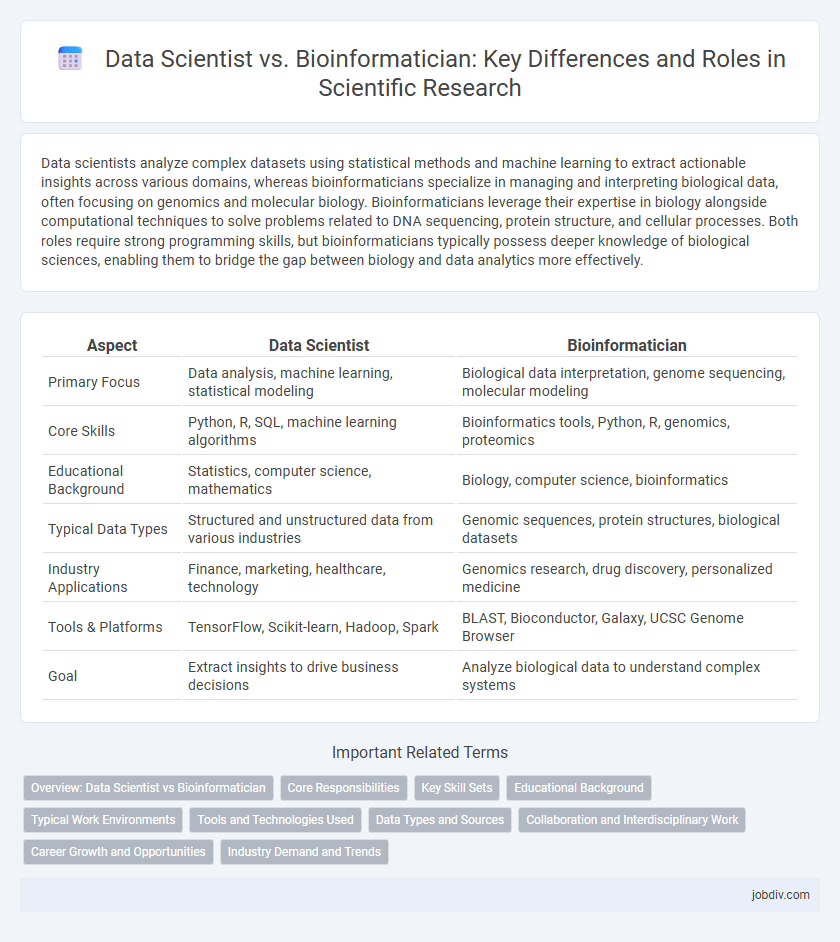Data scientists analyze complex datasets using statistical methods and machine learning to extract actionable insights across various domains, whereas bioinformaticians specialize in managing and interpreting biological data, often focusing on genomics and molecular biology. Bioinformaticians leverage their expertise in biology alongside computational techniques to solve problems related to DNA sequencing, protein structure, and cellular processes. Both roles require strong programming skills, but bioinformaticians typically possess deeper knowledge of biological sciences, enabling them to bridge the gap between biology and data analytics more effectively.
Table of Comparison
| Aspect | Data Scientist | Bioinformatician |
|---|---|---|
| Primary Focus | Data analysis, machine learning, statistical modeling | Biological data interpretation, genome sequencing, molecular modeling |
| Core Skills | Python, R, SQL, machine learning algorithms | Bioinformatics tools, Python, R, genomics, proteomics |
| Educational Background | Statistics, computer science, mathematics | Biology, computer science, bioinformatics |
| Typical Data Types | Structured and unstructured data from various industries | Genomic sequences, protein structures, biological datasets |
| Industry Applications | Finance, marketing, healthcare, technology | Genomics research, drug discovery, personalized medicine |
| Tools & Platforms | TensorFlow, Scikit-learn, Hadoop, Spark | BLAST, Bioconductor, Galaxy, UCSC Genome Browser |
| Goal | Extract insights to drive business decisions | Analyze biological data to understand complex systems |
Overview: Data Scientist vs Bioinformatician
Data scientists specialize in extracting insights from complex datasets using machine learning, statistical analysis, and programming across various industries. Bioinformaticians apply computational techniques specifically to biological data, such as genomics and proteomics, to advance research in molecular biology and personalized medicine. Both roles require strong analytical skills but differ primarily in their domain focus and specialized biological knowledge.
Core Responsibilities
Data Scientists primarily analyze complex datasets using statistical models, machine learning algorithms, and programming languages like Python and R to extract actionable insights across various domains. Bioinformaticians specialize in interpreting biological data, utilizing tools for genome sequencing, protein structure prediction, and molecular modeling to support research in genetics and biotechnology. Both roles require strong computational skills, but Bioinformaticians focus more on integrating biological knowledge with data analysis, whereas Data Scientists apply broader analytical techniques to diverse datasets.
Key Skill Sets
Data scientists excel in statistical analysis, machine learning, and programming languages such as Python and R, enabling them to extract insights from diverse datasets across industries. Bioinformaticians specialize in genomic data analysis, utilizing tools like BLAST and bioinformatics pipelines alongside strong knowledge of molecular biology and genetics. Proficiency in data visualization, algorithm development, and domain-specific databases distinguishes both roles but with differing emphasis tailored to either broad data applications or life sciences research.
Educational Background
Data scientists typically hold degrees in computer science, statistics, or mathematics, emphasizing programming, machine learning, and data analysis techniques. Bioinformaticians generally possess educational backgrounds in biology, genetics, or biochemistry combined with computational skills, focusing on genomic data interpretation and biological databases. Both fields require interdisciplinary knowledge, but bioinformatics prioritizes life sciences expertise alongside computational methods.
Typical Work Environments
Data scientists primarily operate in corporate settings, technology firms, and financial institutions where they analyze large datasets to derive business insights and develop predictive models. Bioinformaticians are commonly employed in academic research labs, pharmaceutical companies, and healthcare organizations, focusing on interpreting biological data such as genomic sequences. Both roles frequently utilize high-performance computing environments and collaborate with interdisciplinary teams, but bioinformaticians often work closer to experimental biology and clinical research contexts.
Tools and Technologies Used
Data scientists typically utilize programming languages such as Python and R, along with tools like TensorFlow, Hadoop, and SQL for big data analytics and machine learning tasks. Bioinformaticians specialize in computational biology tools including Bioconductor, BLAST, and genome assembly software, leveraging high-throughput sequencing data and databases like GenBank. Both professions rely on statistical analysis and data visualization tools but apply domain-specific technologies tailored to their respective fields.
Data Types and Sources
Data Scientists primarily handle diverse data types including structured databases, unstructured text, images, and sensor data gathered from various industries such as finance, marketing, and healthcare. Bioinformaticians specialize in biological data types like genomic sequences, proteomic patterns, and metabolomic profiles, predominantly sourced from high-throughput sequencing technologies, experimental assays, and public biological databases. The emphasis for Data Scientists lies in integrating heterogeneous data for broad analytical insights, whereas Bioinformaticians concentrate on extracting meaningful information from complex biological datasets to unravel molecular mechanisms.
Collaboration and Interdisciplinary Work
Data scientists and bioinformaticians collaborate by integrating statistical modeling, machine learning, and biological data analysis to address complex life science questions. Effective interdisciplinary work leverages data scientists' expertise in algorithms and data infrastructure alongside bioinformaticians' domain knowledge in genomics, proteomics, and molecular biology. This synergy accelerates insights in personalized medicine, drug discovery, and systems biology through combined computational proficiency and biological interpretation.
Career Growth and Opportunities
Data scientists and bioinformaticians both experience robust career growth driven by the increasing demand for big data analytics and biological data interpretation, respectively. Data scientists often find opportunities in diverse sectors such as finance, tech, and healthcare, while bioinformaticians specialize in genomics, drug discovery, and personalized medicine, leading to niche expertise and research-driven roles. Career advancement for bioinformaticians is tightly linked to developments in computational biology and biotechnology, whereas data scientists benefit from broader applications of machine learning and artificial intelligence across industries.
Industry Demand and Trends
Data scientists and bioinformaticians both play crucial roles in analyzing complex datasets, but industry demand diverges as data scientists are highly sought across industries like finance, technology, and healthcare for their broad expertise in machine learning and predictive analytics. Bioinformaticians have a specialized focus on biological data, driving innovation in genomics, drug discovery, and personalized medicine, with growing demand fueled by advancements in next-generation sequencing and precision health. Trends indicate increased cross-disciplinary collaboration, with companies seeking professionals who can integrate computational methods with domain-specific biological knowledge to accelerate research and development.
Data Scientist vs Bioinformatician Infographic

 jobdiv.com
jobdiv.com